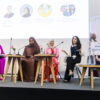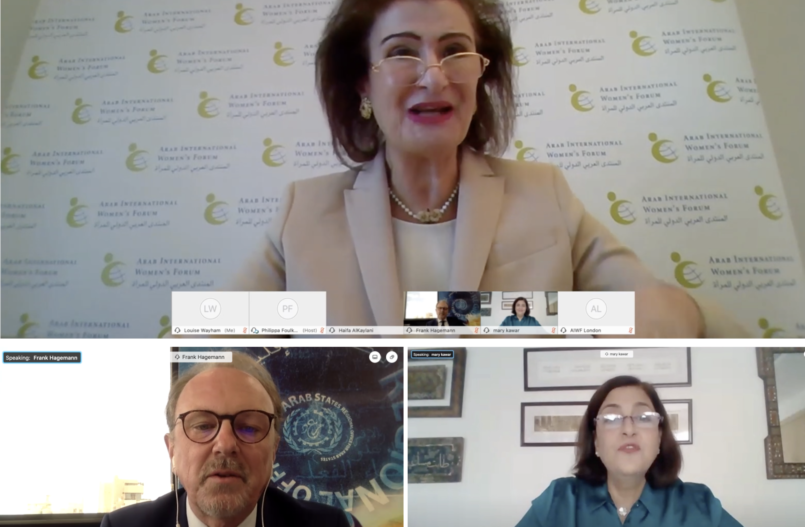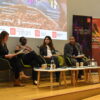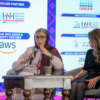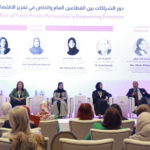Pivotal themes of job creation, women’s economic and entrepreneurial engagement, and youth empowerment were greatly aligned with a key webinar event held in October, The Future of Work in the MENA Region: What will the future Arab workforce look like for women and young people? for which AIWF welcomed Frank Hagemann, Deputy Regional Director of the ILO, and HE Dr Mary Kawar, Former Minister for Planning and International Cooperation, Jordan. The session was chaired by Haifa Al Kaylani as AIWF Founder & Chairman and also as the only Arab Commissioner to have served on the ILO Global Commission on the Future of Work (2017-2019) and to have contributed to the ILO Global Commission’s landmark 2019 report, Work for a brighter future.
In her introduction, Mrs. Al Kaylani shared that youth unemployment rates in MENA have been the highest in the world for more than 25 years, reaching 26.7% in 2020 and largely expected to rise by 2021 because of the pandemic; and this was linked with the high number of unemployed women in the region, which still has the lowest rate of female labour force participation in the world at just 24.6%. “For women and youth to be empowered to participate in today’s difficult labour market as well as the fast-evolving workforce of the future”, she said, the region will need to engage in multi-stakeholder dialogue and commit to macro and micro interventions to directly address the underlying challenges that have held women and young people back in the region.
Many of these interventions were outlined in the ILO Report on the Future of Work published in January 2019 which delivers an excellent framework for an inclusive and equitable solutions to future of work challenges. The ILO report calls for a human centered agenda and a rights-based approach with key recommendations focused around three pillars of action: investing in people’s capabilities, investing in the institutions of work; and investing in decent and sustainable work for all. For the MENA, this means investing in the care economy, green jobs, and infrastructure, and putting into practice a transformative and measurable agenda for gender equality at home and at work. Mrs Al Kaylani said: “it is vital that we address the ongoing challenge of youth employment and implement innovative solutions that mitigate “brain drain” migration of young people to other countries.
It should serve as a call to action for to all of us in the international and regional community that the Arab Youth Survey 2020 reported that nearly half of young Arabs may leave their home country because of lack of job opportunities, poor leadership and widespread economic failure”.
Frank Hagemann, Deputy Regional Director ILO, said: “This is the worst global crisis since World War II and requires unprecedented efforts to support recovery and build back smarter towards a better future of work for all, including for women and youth.” Employment in the Arab region continues to pose a crucial challenge for policymakers, with the region registering high rates of unemployment, even prior to the COVID-19 crisis. These high rates are greatly driven by the region’s inability to generate productive employment opportunities, particularly in the private sector. At the same time he said, “entrepreneurship and selfemployment remain limited in the region”. This is partly the result of the weak business environment that often discourages youth and women from creating their own businesses. Entrepreneurial education remains also limited in a region where education systems have little improved over the years to better respond to the changing labour market needs”.
Mr Hagemann continued: “Women and youth, who were already facing significant labour market challenges before the pandemic, have been particularly affected. An estimated 5 million Arab women, representing 21 per cent of total female employment, are employed in the hard-hit sectors and are thus at high risk of unemployment, reduction in wages and/or hours of work”.
In addition, he noted, “informality is high in the Arab region. An estimated 64% of total employment in the region is informal and lacks support and social protection. Large numbers of youth are employed informally, which render them vulnerable to income and job losses. According to ILO estimates, 82 per cent of all informal economy workers in the Arab region are significantly impacted by lockdown measures”.
What was needed, he shared, were “timely, large-scale and coordinated policies” to protect employment and support businesses and incomes. These policies along with a set of targeted measures should pay particular attention to the needs of women and young people in order first to prevent the youth of today from becoming a “lockdown generation” and second to allow women to realize their full potential in a more inclusive and equitable future of work”.
Further, “the region must focus on structural transformation in order to unleash the potential of the private sector and support the creation of jobs in high value added/ high-productivity sectors, that are more attractive to the increasingly educated young Arab women and men. This would also require increased investments in skills development programmes to support upskilling and reskilling of workers to be able to effectively assume their roles and responsibilities”.
Mr Hagemann also called for reforms to education system to ensure provision of skills needed in current and future labour markets, with emphasis on soft skills and STEM education. “Close linkages between the business sector and education are key”, he said, “to addressing the skills mismatch problem and create skills needed for the jobs of the future”.
HE Dr Mary Kawar, Minister for Planning and International Cooperation, Jordan, reiterated the findings of the Arab Youth Survey which, she said, “reflects feelings engendered by widespread economic and social crises even before and after the Coronavirus pandemic”. When young Arabs emigrate abroad, she said, “they do well and are productive even in more sophisticated and much more demanding technologically advanced economies. In the domestic economy, youth are disillusioned and considered to be unemployable, with high unemployment rates said to derive from lack of motivation, a skills mismatch or low-quality education – all of which somehow disappear once they cross the border.”
Before the pandemic, she shared, “Jordan was experiencing challenges in terms of modest growth, and even this modest growth has to be compared to population growth because when population growth is higher than GDP growth then per capita incomes decrease as is the case in Jordan. This is in addition to high deficits, increasing debts, and no final space for social protection and social assistance public investment. All of this of course is translating into slow job creation.” Across the region, Dr Kawar said, we are “dealing with an economy that does not produce jobs and when we come to the labour market we are then dealing with a segmented labour market (between men and women, nationals and migrants, public and private sectors and formal and informal sectors).”
In addition, she said: “The pandemic is causing major disruptions to education, training and work-based learning, and it has shown us that there are winners and losers in this transformation. The winners are those who can take advantage of these opportunities, the more educated and skilled. The losers are the less educated and the less skilled and those who would lose their jobs in this transition and may have skills but for another era. Overall, the consequences of the pandemic are likely to be deep and long-lasting. They will most likely impact different groups of workers in different ways, such as older workers who are retrenched and will struggle to get back into the labour market; and young job seekers whose delayed entry into the employment puts their future on hold and might be the first to lose their jobs.”
“The increase in long-term unemployment and exclusion of young people from the labour market is the greatest danger in the current situation. Past recessions demonstrate that youth unemployment not only increases swiftly and significantly at the beginning of economic downturns but also that it remains above pre-crisis levels long after the recovery has begun”. Dr Kawar concluded: “While we address the immediate impact of the pandemic, it is also important to address the medium and long term as well, as unless the preexisting structural issues with the economy change, we will continue to face these labour market issues.”
AIWF greatly appreciated Mr Hagemann’s and Dr Kawar’s recommendations for action in the region on mitigating “brain drain “ migration of young people; revitalising the private sector to enjoy dynamic and sustainable growth; creating the necessary conditions for inclusive job creation; and expanding social protection mechanisms which we agree will be vital for economic recovery efforts post-pandemic and in the uncertain years ahead.

